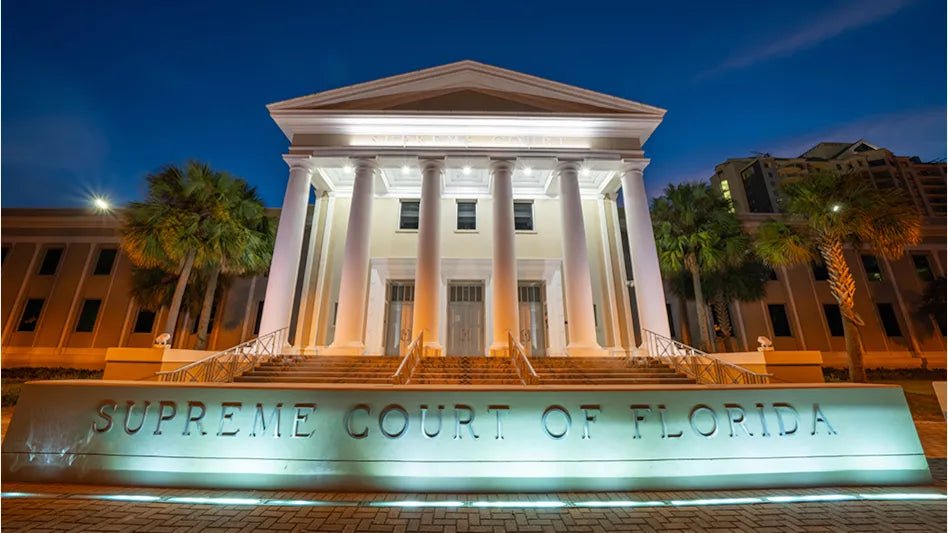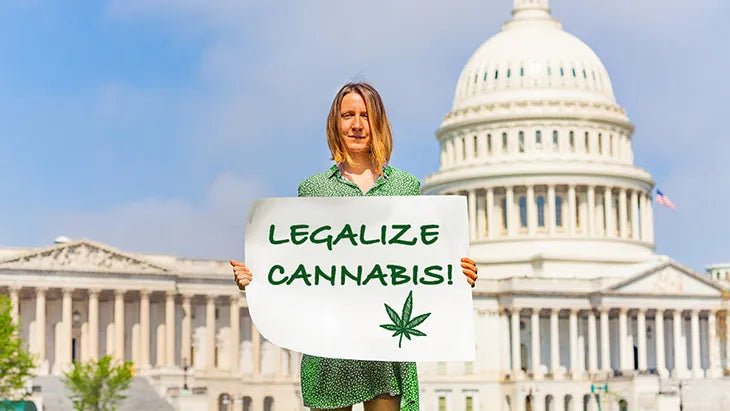Three years after the state legislature passed a measure legalizing the possession of small amounts of marijuana, consumers still have no legal way to purchase cannabis.

The word "law" is a genuinely perplexing paradox in the long and, at times, frustrating history of the human species. While no one is arguing the need for a set of moral and ethical guidelines to protect people from their darker sides, the obsessive need to meticulously micro-manage every single aspect of people's daily lives borders on the absurd, particularly when it comes to items and issues like cannabis legalization.
For the first roughly 20,000 years of human existence, plants like cannabis sativa were viewed primarily as a source of medicine and food. The ancient Egyptian and Chinese empires cultivated the plant for millennia. Likewise, several of the U.S. Founding Fathers, including Thomas Jefferson and George Washington, grew cannabis/hemp for uses ranging from paper to clothing and sails for ships.
It wasn't until the middle of the 20th century that marijuana became subject to the onerous and painfully corrupt American legal system. First targeted by Big Alchohol interests and their partner in crime, William Randolph Hearst (mega media mogul and Elon Musk of his day), cannabis went from a relatively obscure flower smoked by jazz musicians, artists, and the poor to narcotic enemy number one by the mid-1950s.
For the next fifty years, marijuana became the target of President Richard Nixon's ill-fated and racially motivated "War on Drugs." It wasn't until the late 1990s and early 2000s that the plant began to shed its criminal reputation.
Between 1996, when California established the country's first medical marijuana program, and 2012, the year Colorado and Washington became the first two states to legalize recreational cannabis, marijuana transformed from a hard-core narcotic to its more appropriate characterization as a plant medicine.
However, change can be a slow and painful process, particularly for a nation wrapped in the not-so-holy cloth of Judeo-Christian religious dogma. While the rapid expansion of cannabis legalization reform has been remarkably swift and mostly positive for the 23 states where adult-use marijuana is now legal (38 states have medical marijuana programs), for some jurisdictions, like the state of Virginia, ironically the birthplace of Washington and Jefferson, the march toward cannabis liberation is glacial at best.
According to multiple local and national media outlets, Virginia Governor Glenn Youngkin (R), a notoriously conservative Christian, vetoed a measure that would have legalized recreational cannabis sales for adults over 21 this past Thursday, citing a danger to the health and safety of Virginians.
In 2021, state lawmakers legalized the possession of small amounts of marijuana for adults. However, when Republicans took over control of the House of Delegates following an election later in the year, a mandatory second vote to legalize regulated marijuana sales by lawmakers was never held, leaving cannabis consumers in a precarious and frustrating limbo state.
To emphasize his position on the issue, Youngkin vetoed identical bills passed by each chamber of the state legislature (SB 448 in the Senate and HB 698 in the House of Delegates). The twin measures would've created a regulated cannabis market sector in the state, including provisions for licensing small and large retail dispensaries.
In his veto statement following his executive decision to reject the bill, Youngkin said, "The proposed legalization of retail marijuana in the Commonwealth endangers Virginians' health and safety. States following this path have seen adverse effects on children's and adolescent's health and safety, increased gang activity and violent crime, significant deterioration in mental health, decreased road safety, and significant costs associated with retail marijuana that far exceed tax revenue."
"The proposed legalization of retail marijuana in the Commonwealth endangers Virginians' health and safety. States following this path have seen adverse effects on children's and adolescent's health and safety, increased gang activity and violent crime, significant deterioration in mental health, decreased road safety, and significant costs associated with retail marijuana that far exceed tax revenue."
- Virginia Governor Glenn Youngkin's Veto Statement
The governor's blatantly partisan and unpopular decision to veto does not come as a surprise to politicos or cannabis reform advocates. Youngkin has gone on the record numerous times deriding the proposed legislation and stating his vehement opposition to legalized adult-use sales.
Democratic leaders hoped to use the legislation as a bargaining chip during negotiations for an ambitious and controversial plan to construct a $2 billion sports complex in northern Virginia, which Governor Youngkin supports. However, lawmakers passed the state's final budget earlier this month, excluding funding for the proposal, setting the stage for Thursday's veto.
Not surprisingly, many prominent Democrats blasted Youngkin for his decision. Democratic Delegate Paul Krizek, the lead sponsor of the cannabis marketplace bill in the House, said the governor's actions will only serve further to empower the state's unregulated illicit black market.
"Governor Youngkin's failure to act allows an already thriving illegal cannabis market to persist, fueling criminal activity and endangering our communities. This veto squandered a vital opportunity to safeguard Virginians and will only exacerbate the proliferation of illicit products, posing greater risks to our schools and public safety," Krizek said in a statement.
"Governor Youngkin's failure to act allows an already thriving illegal cannabis market to persist, fueling criminal activity and endangering our communities. This veto squandered a vital opportunity to safeguard Virginians and will only exacerbate the proliferation of illicit products, posing greater risks to our schools and public safety."
- VA Democratic Delegate Paul Krizek, Lead Sponsor of Legalization Bill
The bill's Senate sponsor, Democratic state Senator Aaron R. Rouse, also soundly criticized Youngkin's refusal to sign the measure into law.
"This veto blocks a pivotal opportunity to advance public health, safety, and justice in our Commonwealth. (The governor's) dismissive stance towards addressing Virginia's cannabis sales dilemma is unacceptable. Public servants are obligated to tackle pressing issues. This legislation would have combated the illegal market & ensured access to safe, tested, and taxed cannabis products," Rouse said in a written statement.
"This veto blocks a pivotal opportunity to advance public health, safety, and justice in our Commonwealth. (The governor's) dismissive stance towards addressing Virginia's cannabis sales dilemma is unacceptable. Public servants are obligated to tackle pressing issues. This legislation would have combated the illegal market & ensured access to safe, tested, and taxed cannabis products."
- VA State Senator Aaron R. Rouse, Bill's Lead Sponsor in the Senate
Youngkin further infuriated Democrats and some from his own party by also vetoing a cannabis sentence modification bill (SB 696) spearheaded by the Last Prisoner Project, a nonprofit organization dedicated to securing the release of all those incarcerated for cannabis-related crimes.
The group's policy manager, Adrian Rocha, condemned the veto as a continuation of an outdated and damaging policy.
"Under the bill, thousands of individuals charged for cannabis offenses under outdated laws would have had their sentences reevaluated in light of legalization. Instead, the Governor's veto message not only ignored the intention of this bill but, more importantly, ignored the plight of thousands of families across the Commonwealth whose lives have been permanently altered by prohibitionist laws repealed three years ago," Rocha shared in a statement.
"Under the bill, thousands of individuals charged for cannabis offenses under outdated laws would have had their sentences reevaluated in light of legalization. Instead, the Governor's veto message not only ignored the intention of this bill but, more importantly, ignored the plight of thousands of families across the Commonwealth whose lives have been permanently altered by prohibitionist laws repealed three years ago."
- Adrian Rocha, Policy Manager for the Last Prisoner Project
Despite the setbacks on both pieces of legislation, Democrats and a surprising number of maverick Republicans can still make the measures law by overriding Youngkin's vetoes. The state legislature reconvenes at the capitol on April 17 to reconsider bills vetoed or amended by the governor.
If they cannot garner enough votes to reverse the decision, the primary winners will be the state of Maryland and the Eastern Band of Cherokee Indians (EBCI). Maryland already has one of America's fastest-growing and most successful adult-use industries.
Likewise, the EBCI in Western North Carolina will open its first recreational dispensary on April 20, 2024. In the end, weed consumers will go where it is legal to purchase. The governor of Virginia is only hurting his state's economy and its citizens. He may want to think about his choices as election day looms.








































